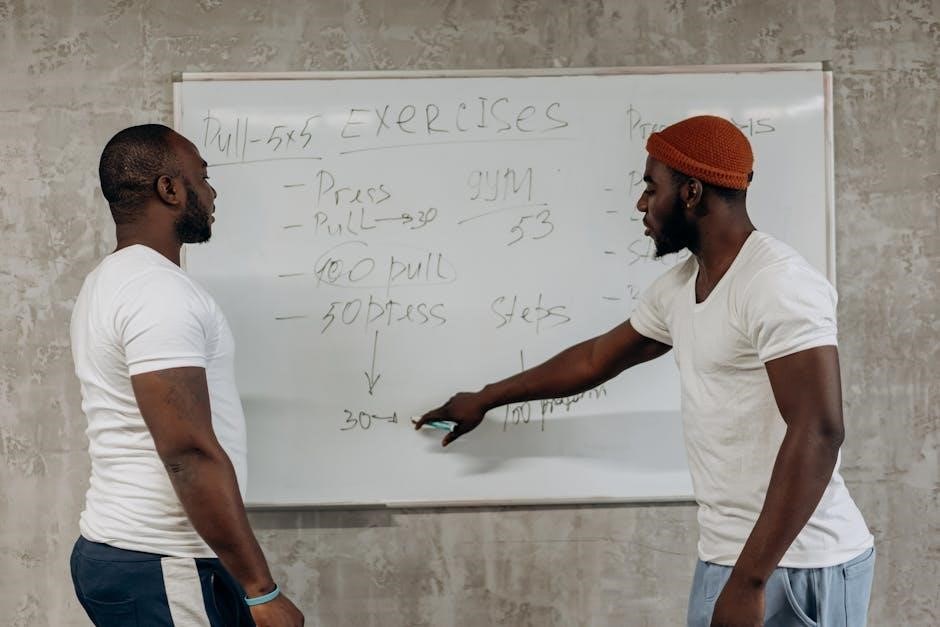Instructional coaching is a collaborative‚ data-driven approach to professional development focused on enhancing teaching practices and student learning․ It involves partnerships between coaches and educators to set goals‚ implement strategies‚ and reflect on outcomes․ Unlike traditional training‚ coaching is personalized‚ ongoing‚ and centered on classroom application‚ aiming to build teacher efficacy and sustain improvement․
Definition of Instructional Coaching
Instructional coaching is a personalized‚ collaborative process designed to enhance teaching practices and improve student learning outcomes․ It involves instructional coaches working closely with teachers to identify areas for growth‚ set data-driven goals‚ and implement evidence-based strategies․ Coaches provide one-on-one support‚ including classroom observations‚ feedback‚ and professional development opportunities‚ all tailored to the unique needs of each educator․ This approach emphasizes teacher efficacy and student success‚ fostering a culture of continuous improvement․ Unlike traditional professional development‚ instructional coaching is not a one-size-fits-all model; it is adaptive and focused on individual teacher development․ Coaches do not evaluate teachers but rather empower them through reflective practices‚ actionable insights‚ and shared responsibility for student progress․ Instructional coaching is rooted in mutual respect and trust‚ aiming to build capacity and confidence in educators․ By focusing on specific‚ measurable objectives and leveraging real-time data‚ instructional coaching creates a pathway for sustainable growth in teaching and learning environments․
The Role of an Instructional Coach
An instructional coach plays a pivotal role in enhancing teaching practices and student learning by providing targeted support to educators․ Coaches work closely with teachers to identify areas for improvement‚ develop personalized growth plans‚ and implement evidence-based strategies․ Their primary focus is on fostering teacher efficacy‚ which directly impacts student outcomes․ Coaches observe classrooms‚ offer constructive feedback‚ and facilitate professional development opportunities tailored to individual or school-wide needs․ They act as facilitators of growth‚ encouraging reflective practices and collaboration among educators․
The role also involves analyzing data to set measurable goals and track progress․ Coaches ensure that their support is aligned with school objectives and student needs‚ creating a bridge between professional development and classroom application․ Unlike evaluators‚ instructional coaches do not assess teacher performance but rather empower educators through shared ownership of student success․ Their expertise lies in helping teachers refine their skills‚ adopt innovative teaching methods‚ and address specific challenges․ By fostering a culture of continuous improvement‚ instructional coaches contribute to a more effective and resilient educational environment․ Their work is rooted in collaboration‚ trust‚ and a commitment to enhancing both teaching quality and student achievement․

What Instructional Coaching Is
Instructional coaching is a collaborative‚ data-driven process aimed at enhancing teacher effectiveness and student outcomes․ It emphasizes a partnership approach‚ focusing on personalized growth and evidence-based practices․ Coaching is not a one-size-fits-all strategy but a tailored support system designed to meet specific needs and improve educational experiences effectively․

A Partnership Approach to Professional Development
Instructional coaching thrives on a collaborative relationship between the coach and the teacher‚ fostering mutual respect and shared goals․ This partnership is rooted in trust‚ open communication‚ and a commitment to professional growth․ Unlike traditional professional development models‚ coaching is not a top-down approach but a side-by-side journey where both parties actively contribute to improving teaching practices and student outcomes․
The coach’s role is to empower teachers by providing tailored support‚ resources‚ and strategies․ This collaborative dynamic ensures that teachers feel valued and heard‚ which is essential for meaningful growth․ The partnership is not about imposing methods but about co-constructing solutions that align with the teacher’s unique context and student needs․

By focusing on shared goals‚ instructional coaching creates a sense of ownership and accountability․ Teachers are encouraged to reflect on their practices‚ identify areas for improvement‚ and implement changes in a supportive environment․ This partnership approach not only enhances teacher efficacy but also fosters a culture of continuous learning and innovation within schools․
Ultimately‚ the success of instructional coaching lies in its ability to build capacity through collaboration․ When teachers and coaches work together as equals‚ the result is a more impactful and sustainable improvement in teaching and learning․ This partnership-driven model is at the heart of what makes instructional coaching an effective tool for professional development․

Focused on Teacher Efficacy and Student Learning
Instructional coaching is designed to enhance teacher efficacy‚ empowering educators to improve their instructional practices and directly impact student learning outcomes․ By focusing on the teacher’s ability to create meaningful learning experiences‚ coaching ensures that professional development is both relevant and impactful․ The ultimate goal is to equip teachers with the skills and confidence needed to support students in achieving their full potential․
Coaches work closely with teachers to identify strengths‚ address challenges‚ and develop strategies tailored to their specific classroom needs․ This personalized approach fosters a growth mindset‚ encouraging teachers to reflect on their practices and explore innovative ways to engage students․ By aligning coaching efforts with student data and learning goals‚ the process ensures that improvements in teaching directly translate to improved student outcomes․
The emphasis on teacher efficacy is central to instructional coaching․ When teachers feel confident in their abilities and see the positive results of their efforts‚ they are more likely to implement new strategies and maintain a high level of professionalism․ This‚ in turn‚ creates a more dynamic and effective learning environment for students․ Coaching not only benefits individual teachers but also contributes to a culture of continuous improvement within the school community․
Ultimately‚ instructional coaching is a student-centered approach‚ as the improvements in teaching practices are intended to enhance the quality of education students receive․ By focusing on both teacher growth and student success‚ instructional coaching serves as a powerful tool for fostering academic excellence and lifelong learning․ This dual focus ensures that coaching initiatives are both meaningful and sustainable over time․
Data-Driven and Goal-Oriented
Instructional coaching is a data-driven and goal-oriented process that relies on evidence to inform decision-making and guide professional development․ Coaches and teachers collaborate to identify specific‚ measurable goals aligned with student learning outcomes and classroom needs․ Data‚ such as student performance metrics‚ classroom observations‚ and teacher feedback‚ are used to track progress and refine strategies․
The goal-oriented nature of instructional coaching ensures that efforts are focused and intentional․ Coaches work with teachers to establish clear objectives‚ develop action plans‚ and monitor implementation․ This structured approach helps teachers stay on track and make adjustments based on outcomes․ By leveraging data‚ coaching moves beyond general advice to provide targeted support tailored to individual and school-wide priorities․

The emphasis on data ensures accountability and transparency in the coaching process․ Regular assessments and reflections allow teachers and coaches to celebrate successes and address challenges promptly; This iterative cycle of planning‚ implementing‚ and evaluating fosters continuous improvement and ensures that coaching efforts yield meaningful results for both teachers and students․
Ultimately‚ the data-driven and goal-oriented framework of instructional coaching maximizes its impact․ By grounding the process in measurable outcomes and clear objectives‚ coaching becomes a powerful tool for enhancing teaching practices and advancing student achievement․ This approach not only supports individual growth but also contributes to the broader goals of educational excellence․

What Instructional Coaching Is Not
Instructional coaching is not a quick fix or a one-time evaluation․ It is not solely focused on test scores or a top-down directive․ Coaching is not about imposing methods but fostering growth through collaboration․ It is not a replacement for teacher autonomy but a supportive process to enhance teaching practices and student outcomes sustainably․
Not a One-Size-Fits-All Approach
Instructional coaching is not a universal solution applied identically to all teachers․ Instead‚ it is a highly personalized and adaptive process tailored to the unique needs‚ skills‚ and contexts of individual educators․ Coaches work closely with teachers to identify specific goals‚ challenges‚ and strengths‚ ensuring that support is relevant and impactful․ This approach recognizes that teaching is complex and influenced by factors like classroom dynamics‚ student demographics‚ and curriculum requirements․ Unlike generic professional development programs‚ instructional coaching is flexible and evolves as teachers grow and circumstances change․ Coaches adapt their strategies to meet the diverse needs of their partners‚ whether through one-on-one mentoring‚ small group collaboration‚ or school-wide initiatives․ This customization ensures that coaching remains meaningful and effective‚ fostering sustainable improvements in teaching practices and student outcomes․ By prioritizing individualization‚ instructional coaching empowers teachers to take ownership of their professional development‚ making it a powerful tool for long-term educational success․
Not a Replacement for Teacher Professional Development
Instructional coaching is not a substitute for traditional teacher professional development (PD) programs․ While both aim to enhance teaching practices and student learning‚ they serve distinct roles in a teacher’s professional growth․ Professional development often involves structured workshops‚ training sessions‚ or conferences that provide educators with broad knowledge‚ updates on educational trends‚ and exposure to new teaching strategies․ These programs are typically designed for groups and focus on specific themes or skills․ Instructional coaching‚ on the other hand‚ is a more personalized and ongoing process that focuses on individual teacher needs‚ classroom-specific challenges‚ and the application of strategies in real-time․ Coaching complements professional development by helping teachers bridge the gap between theoretical knowledge and practical implementation․ It provides tailored support‚ enabling teachers to refine their skills‚ reflect on their practices‚ and address specific student learning goals․ Rather than replacing PD‚ instructional coaching enhances its effectiveness by offering sustained‚ one-on-one guidance and feedback․ Together‚ these approaches create a comprehensive system for teacher growth‚ ensuring that educators have both the foundational knowledge and the practical support needed to excel in the classroom․
Not Limited to Classroom Observations
Instructional coaching extends far beyond the confines of classroom observations․ While observations are a valuable tool for understanding teaching practices and student interactions‚ coaching encompasses a wide range of activities designed to support teacher growth and improve student outcomes․ Coaches work with teachers to set professional goals‚ develop personalized action plans‚ and implement evidence-based strategies tailored to specific classroom needs․ They also engage in reflective conversations‚ providing constructive feedback that helps teachers refine their skills and address challenges․
Additionally‚ instructional coaches often facilitate collaboration among teachers‚ helping to build a culture of shared learning and professional development within schools․ They may lead professional learning communities‚ organize peer coaching opportunities‚ or design workshops on innovative teaching methods․ Coaches also play a key role in analyzing student data to identify trends and areas for improvement‚ working with teachers to adjust instruction accordingly․ Furthermore‚ they may provide resources‚ such as instructional materials or technology‚ to enhance teaching practices and support diverse learner needs;
Coaching is not a one-time event but an ongoing process that involves continuous dialogue‚ planning‚ and problem-solving․ By focusing on both the instructional and relational aspects of teaching‚ coaches help educators grow professionally while fostering a supportive and collaborative school environment․ This holistic approach ensures that coaching impacts not only individual teacher development but also the broader educational community․

The Core Principles of Instructional Coaching
Instructional coaching is grounded in several core principles that ensure its effectiveness in supporting teacher growth and enhancing student learning․ At its heart‚ coaching is a collaborative and partnership-based approach‚ emphasizing mutual respect and shared responsibility between coaches and educators․ This collaborative spirit fosters trust‚ open communication‚ and a safe environment for risk-taking and professional development․
A Focus on Teacher Efficacy
Coaching is centered on building teachers’ confidence and capacity to improve student outcomes; By identifying strengths and areas for growth‚ coaches empower educators to take ownership of their professional development and make data-driven decisions․

Goal-Oriented and Data-Driven
Effective coaching begins with clear‚ measurable goals aligned with school priorities and student needs․ Coaches and teachers collaboratively analyze data to inform instruction‚ track progress‚ and adjust strategies as needed; This ensures that coaching efforts are purposeful and impactful․

Personalized and Contextual
Instructional coaching recognizes that every teacher and classroom is unique․ Coaches adapt their support to meet the specific needs of individual educators‚ considering factors like teaching style‚ student demographics‚ and school culture․
Emphasis on Student Learning
Ultimately‚ the goal of instructional coaching is to improve teaching practices that directly benefit student learning․ Coaches work with teachers to design and implement strategies that address diverse learner needs and promote academic success․
Sustainability and Long-Term Growth
Coaching is not a quick fix but a long-term investment in teacher development․ Coaches equip educators with the skills and knowledge needed to sustain improvements over time‚ fostering a culture of continuous learning and improvement․
By adhering to these principles‚ instructional coaching becomes a powerful tool for transforming teaching practices and achieving lasting educational impact․
